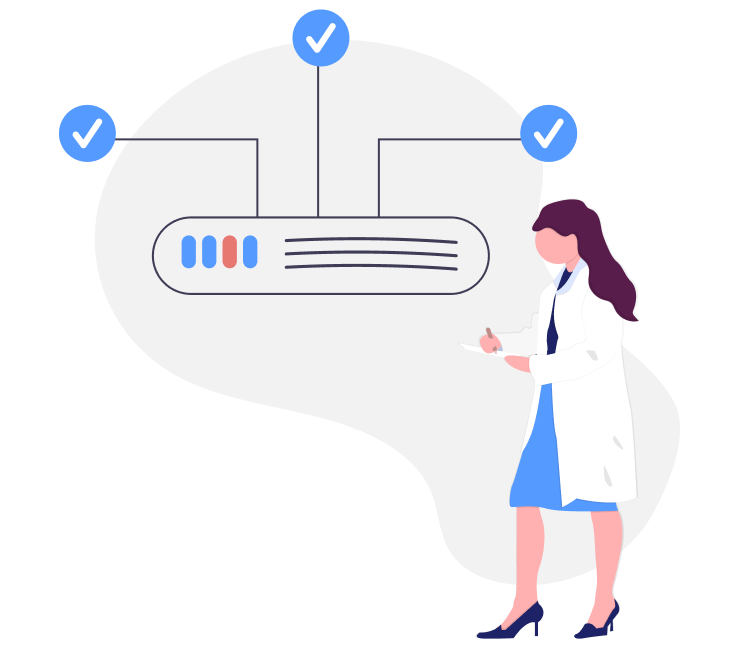Learn more about genetics and DNA
Heredity and cancer
At Eiira launch party, Dr. Svetlana Bajalica Lagercrantz talked about the role of genes in cancer risks.

Genes
Genes are the physical and functional genomes that carry the information that gives us our characteristics. All the physical characteristics that we have acquired from generation to generation are passed on through our genes.
A gene is a sequence of DNA, which contains the instructions for how specific proteins should look in our bodies. Genes contain information that controls things like eye or hair color, or other characteristics that you inherited from your parents, who in turn inherited them from their parents.
DNA sequencing
DNA sequencing is a method for mapping the sequence of nucleotides (nitrogen bases) in a strand of DNA. The order of the different nucleotides (often referred to as A, T, C and G) in the DNA sequence controls the function of our cells and how the body makes protein. DNA sequencing can therefore provide information on possible disease predispositions that you can pass on to your children.
Today there are various techniques for sequencing DNA and the development of these methods is progressing rapidly. The most common method for carrying out DNA sequencing today is next generation sequencing (NGS).


Gene variants
Gene variants are changes in an individual's DNA sequence. These changes can be either inherited or acquired during one's life. The inherited variants (known as germ cell mutations) are passed on through our parents' reproductive cells (egg and sperm cells). These variants are therefore usually present in all cells of the body and can be passed on to the next generation. Acquired variants, on the other hand, arise during a person's lifetime, for example due to sun exposure or smoking, and are not found in the germ cells but in a limited number of the body's somatic cells. A non-inherited variant that arose at some point during prenatal development is called a de novo mutation, and thus cannot be detected in the parents.
Our gene variants are the individual variations (such as eye colors or blood types) that make each of us unique. Most of our gene variants are normal variants that have no impact on health. There are also a small number of disease-associated variants (also known as pathogenic mutations), which prevent the body's cells from functioning properly, increasing the risk of disease.
The overall risk analysis of hereditary diseases contained in EIira's genetic profiles uses information on mutations that increase the risk of cancer.

Different types of genetic tests
Molecular genetic tests are used to examine a person's DNA and detect gene variants. These variants (mutations) are sometimes associated with genetic diseases. These genetic tests are used to diagnose genetic abnormalities and to assess the risk of a person developing or passing on a genetic disease to their children.
Depending on which part of the DNA or amount of DNA is sequenced, molecular genetic tests can be categorized as follows:
- Whole Genome Sequencing (WGS).
- Whole Exome Sequencing (WES).
- Genotyping
Whole genome sequencing (WGS)
Whole genome sequencing is the most comprehensive method. It contains information about the entire genome and can thus reveal gene variants in any part of the genome. This is very important because gene variants that can lead to genetic abnormality can be found in different parts of the genome.
Although whole genome sequencing is the most powerful method to identify all pathogenic variants, it requires a large amount of data and more sophisticated analysis, resulting in an increased cost and time.
Eiira Genetics offers hereditary genetic risk profiling, which means we only examine hereditary genes that you inherited from your parents' reproductive cells at conception. The advantage of Eiira's whole genome sequencing test is that with only one test, you can receive updates on future scientific findings throughout your lifetime.


Whole Exome Sequencing (WES)
Whole-exome sequencing looks only at the human exome. Exome is a collective name for all exons in the genome. An exon is a DNA sequence responsible for making protein. The exome makes up about 1% of the human genome, but contains the majority (85%) of disease-related gene variants. Therefore, whole-exome sequencing is an effective method to identify potential disease-causing gene variants.
Compared to genotyping, WES is superior because it is not limited to the number of genes (as long as it is within the exome) and the number of diseases predefined in genotyping. However, the disadvantage is that if a pathogenetic variant lies outside the exon region, it will not be identified.
The advantage of Eiira's whole-exome sequencing test is that with only one test in the context of the exome and its association with hereditary disease risk, you can receive updates on future scientific findings throughout your lifetime.
Genotyping (gene panel test)
Targeted genotyping, often called gene panel testing, isolates and analyzes one or a subset of genomic regions (usually less than 0.5% of the genome). There are different ways to perform genotyping, such as through microarrays or sequencing.
This type of test is usually faster and more cost-effective and is often used when a person has symptoms and his/her healthcare provider has reason to suspect specific variants of one (or more) genes. In addition, it is often used for direct-to-consumer testing to profile selected variants of specific genomic regions (but not all possible variants in these regions).

Not sure which product is right for you?
Get in touch with us! Leave us your message and contact details, and we’ll get back to you.